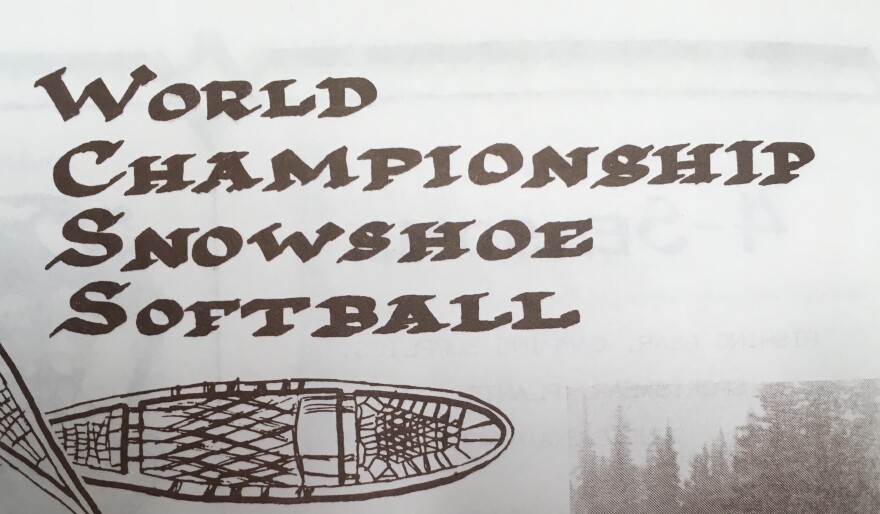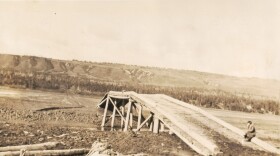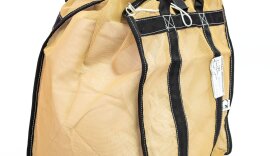This week, Emilie Springer takes on a tour of the Homer Winter Carnival, circa 1977, when the theme was, “Those were the days.”
Emilie Springer regularly brings us observations on people, places and things in and around Homer.
Homer Winter Carnival theme title for 1977: “Those Were the Days.”
The carnival guide opens with a short introduction to the community, though composed anonymously, the piece informs the reader about several familiar tips to Homer history: gold seeking, coal fields, early 1900 homesteading, the construction of the Sterling Highway. A few other facts from the 1970’s that could use some revisions:
• “Fishing and seafood processing have long been the most stable segments of the economy. King crab, tanner and Dungeness crab, halibut, shrimp and herring are the major commercial catches.”
• “The community has a modern 10 bed hospital, 2 resident doctors and dentists.”
The introduction mentions school facilities, church denominations and the role of the Kenai Mountains in attracting people to Homer because of protection from cold breezes of the Gulf of Alaska. New industrial potentials: cattle and farming enterprises, hydro-electric power, large port construction and the University of Alaska’s “Red Meat Research Center” (that might be an interesting story to follow up on, I can’t quickly find any information on what the “Red Meat Research Center” entailed).
The program offers acknowledgements for the weekend production and it’s clear that the Queen Pageant was a key feature: who created the Queen’s float for the parade, executive and assistant directors for the contest, lighting and sound technicians, master of ceremonies, hair style design, donors for the Queen’s parka and crown. And, that’s how the weekend kicks off: the carnival pageant. There are six contestants, including one young woman from Ninilchik. (Incidentally, on display in the Pratt’s current show “Familiar Faces: Portraits of Community” are photos of 4 different pageant queens and the crown and scepter passed through the years).
The parade is a big event (“the Queen and her court are honored to ride here”), there is an arts and craft show (hosted by the museum), a wrestling tournament, youth hockey tournament (on an old rink behind what is now Homer Middle School), “snow roamer races,” dog sled mushing, snowshoe softball (where Homer’s team competes with Coast Guard challengers from the Cutter Sedge), a showing of Charlie Chaplin’s “The Gold Rush.” On Sunday, the program reader is invited to “attend the church of your choice” and then an Ohlson Mount ski meet (where skiers are “urged to send in their $1.50 entry fee before the race, with a name and post office box listed for submission), Ice Hot Rod Championship races where observers can vote for the “Pretty Car Award,” a dog weight pulling contest and the Men’s city league basketball championship.
In the scattered advertisements, it’s fun to see some of the old community buildings and how sites have transitioned (or not) over the years. The Icicle plant (previously Seward Seafoods) dock is labeled Whitney-Fidalgo Seafoods, the old Proctor’s Grocery is now home to Nomar, the Bunnell building as the Inlet Trading Post, Kachemak Bowl, Quiet Sports, the Grog shop and the Pratt Museum post familiar ads.
Finally, a concluding page long composition from the North Pacific Fisheries Association, started in 1955 and still present in Homer today comments provide a tone to industries now bygone: “not to be forgotten are Homer trawl shrimp fishermen. Working year round, they lift from the briny deep as much as 45,000 pounds of tasty pink shrimp per day. In all, 10 million pounds of seafood product is harvested from Kachemak Bay and lower Cook Inlet yearly. Winter fishermen alone account for 6 million. The North Pacific Fisheries Association salutes the winter fishermen of Homer!”
Those were the days!





